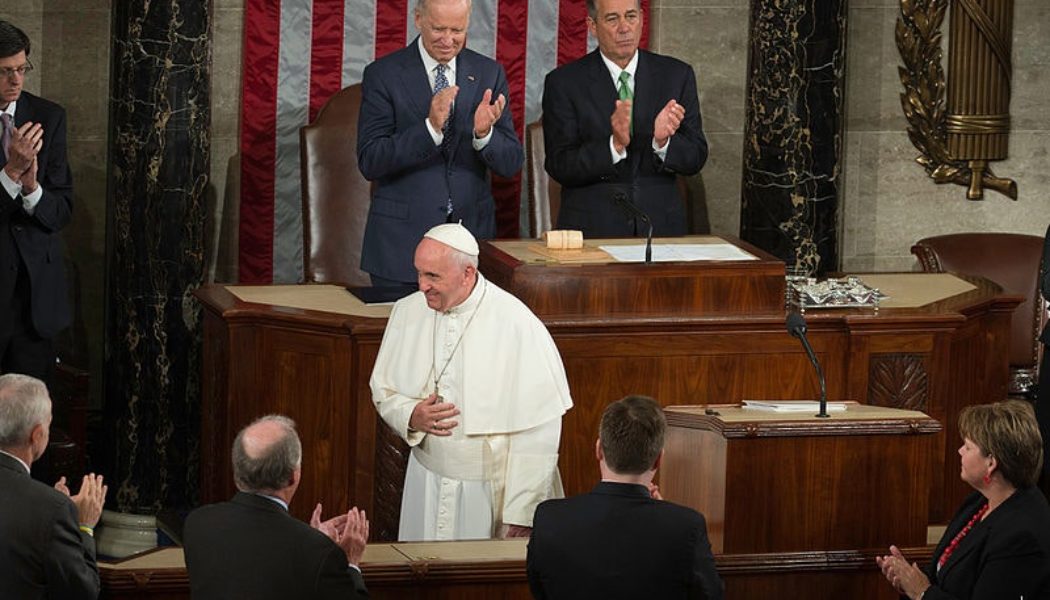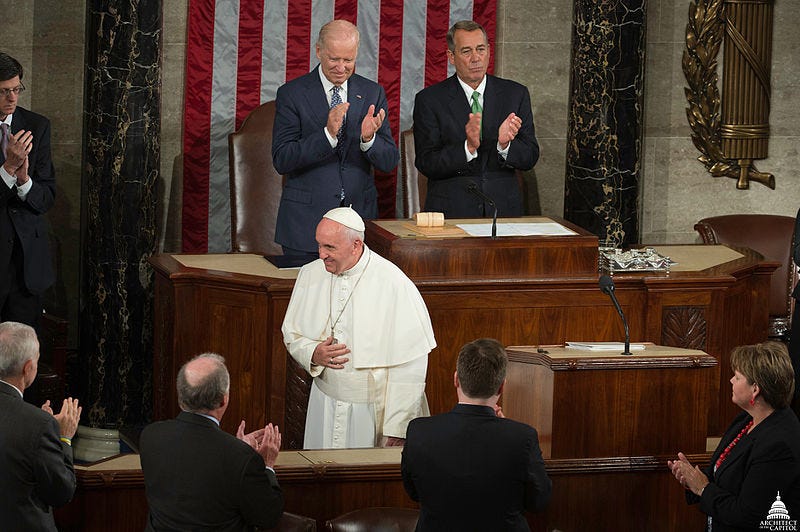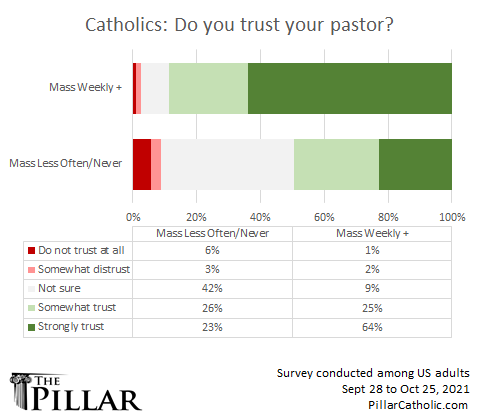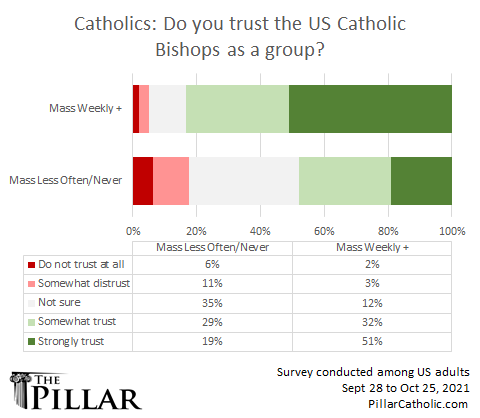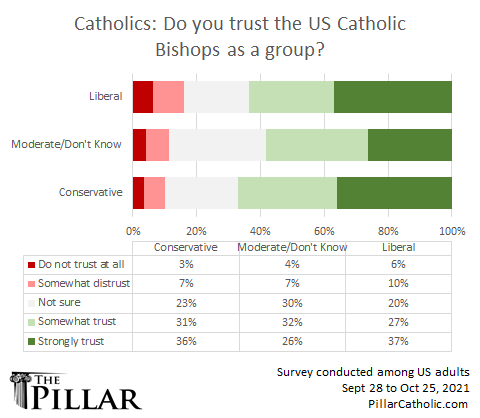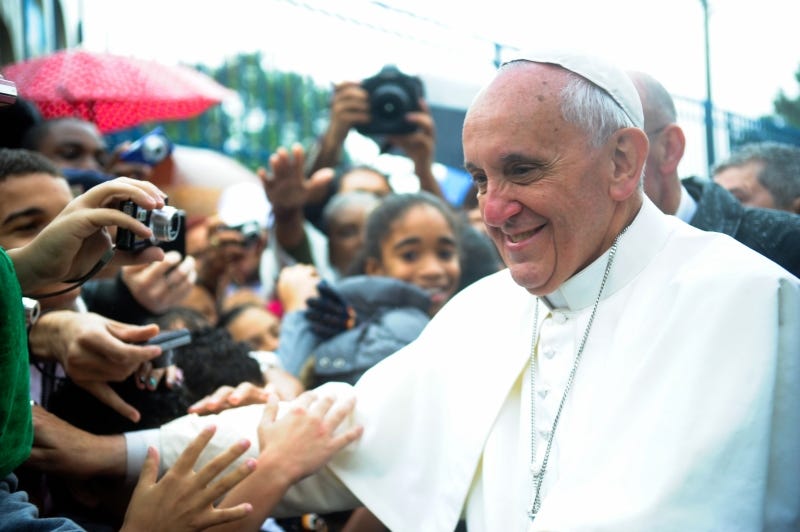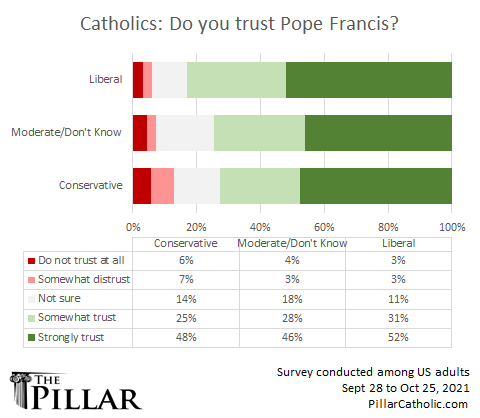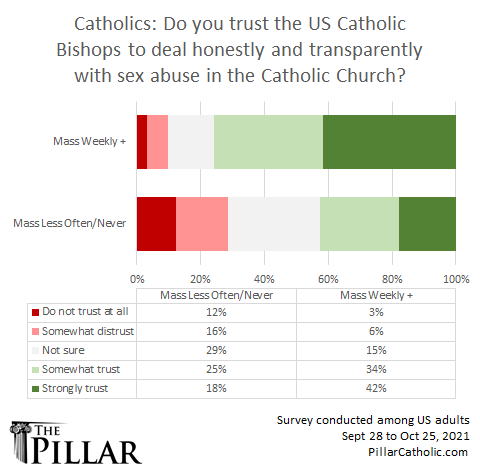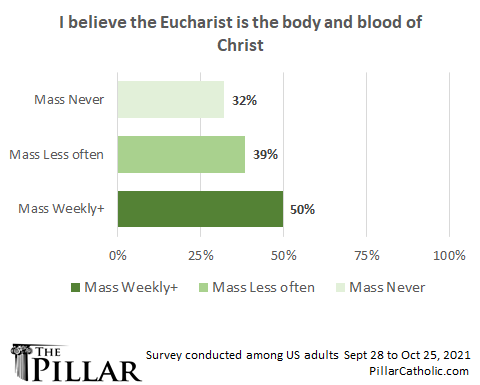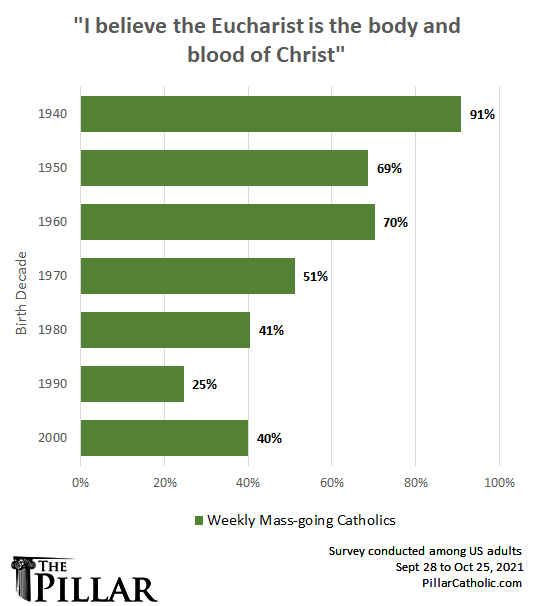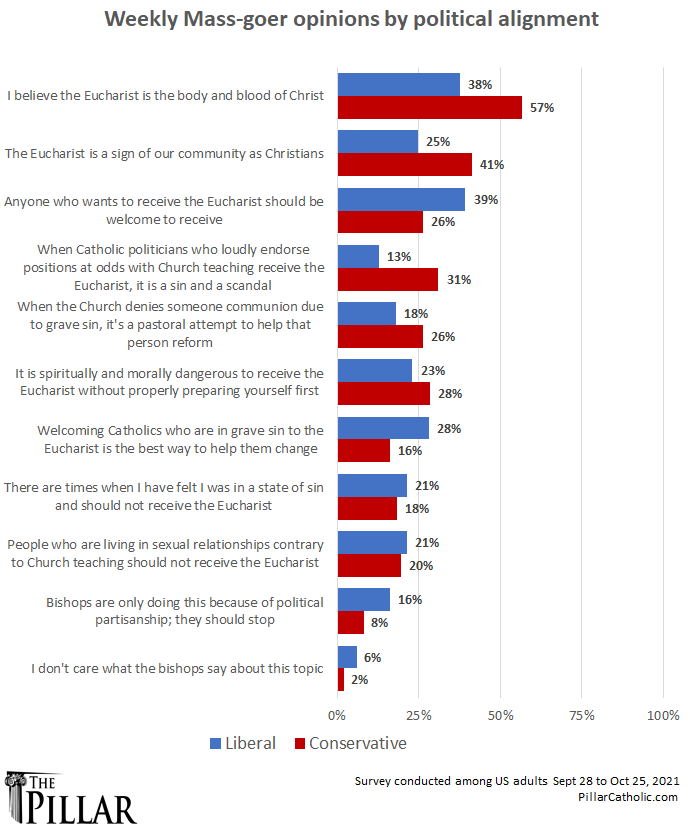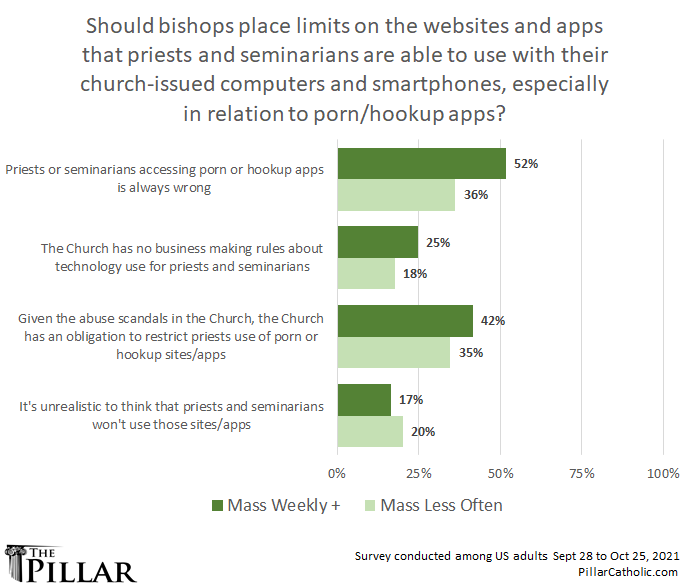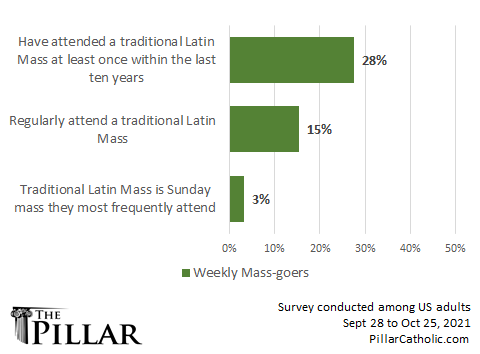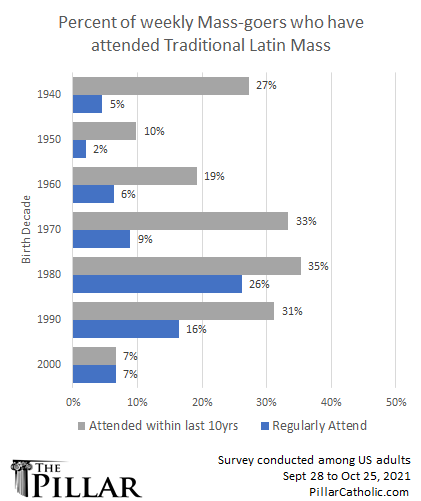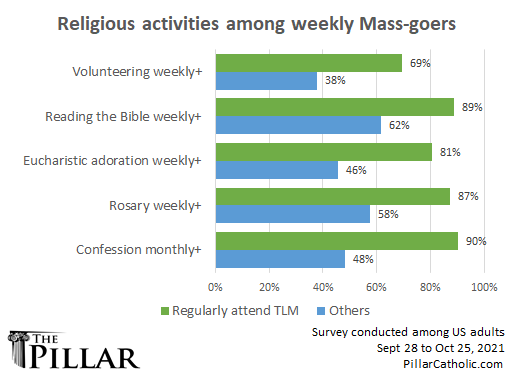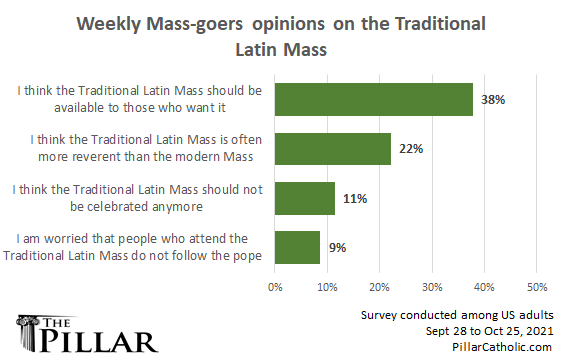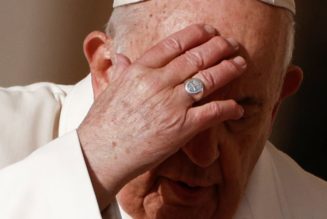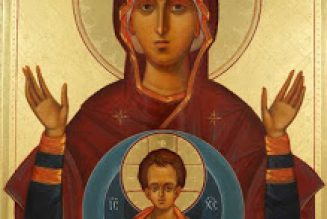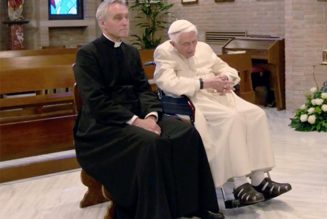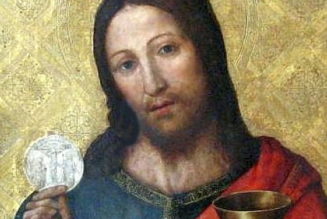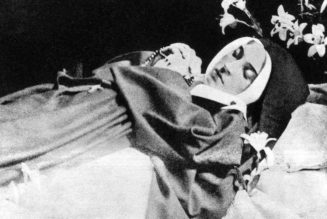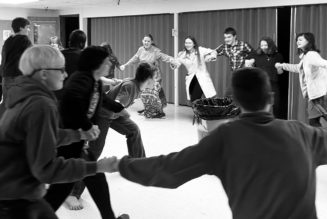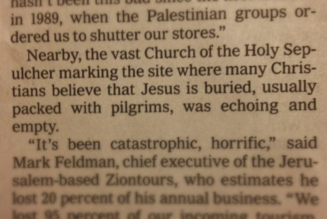More than three-quarters of weekly Massgoing U.S. Catholics trust Catholic bishops to deal honestly and transparently with sex abuse in the Catholic Church. On the whole, Catholics who practice the faith with regularity are far more likely to report trusting both local and national leaders in the Church. And trust in Pope Francis is high among both Catholics who regularly practice the faith and those who do not.
Those results are part of The Pillar’s Survey on Religious Attitudes and Practices, which aims to better understand the religious perspectives, identities, and perspectives of American adults. We’re reporting the results of that survey this week in a series of special reports.
The same survey also found that older weekly Massgoers are more likely to believe in the real presence of Christ in the Eucharist than younger ones.
In part one of this series, The Pillar looked at America’s changing religious landscape. In part two, we look at what factors influence lifelong Catholic religious practice, and why people say they leave the Church. In part three, we took a look at what can be learned about religiously disaffiliated Americans. In part four, we looked at how the pandemic has reshaped parish life.
In this installment, we look at the attitudes among Catholics on some current issues in the Church’s life, including the Extraordinary Form of the Mass, the Synod on Synodality, and the real presence of Christ in the Eucharist.
If you’re interested in the technical details of our survey work, here they are: The Pillar worked with research firm Centiment to conduct the survey, which was conducted online with 2653 members of Centiment’s nationally representative research panel. This included a nationally representative sample of 1564 Americans and an oversample of 1089 additional respondents who had been raised Catholic, which we used in order to better understand those raised Catholic who still identify as Catholic, and those who now call themselves members of other faiths or of no faith at all. We’ll publish our full-data set later this week.
Registration time
Americans have become increasingly distrustful of institutional religion in recent decades, and with Catholic clerical sexual abuse in the headlines in recent decades, we wanted to understand to what extent American Catholics trusted their local institutional Church.
We also wondered how connected those Catholics are.
Overall, 43% of self-identified Catholic respondents to The Pillar’s Survey on Religious Attitudes and Practice said that they are registered in a Catholic parish. Among those who said they go to Mass at least weekly, that number was 69%. Even among weekly Massgoers there’s a stark age divide: 74% of those born from 1950 to 1989 are registered in a parish, while only 45% of weekly Mass goers born since 1990 are.
That many parishes require registration in order to have a child baptized might be a major factor here. 56% of Catholics who attend Mass weekly but have no children are registered with a parish, compared to 75% of those who have children.
Weekly Massgoers born outside the U.S. are less likely to be registered in a parish (37%) while those born in the US are more likely to be (74%). Hispanics in general are less likely to be registered, with 55% of U.S.-born Hipsanics who go to Mass weekly registered with a parish and just 18% of those born outside the U.S. being so.
We also asked whether respondents knew the name of their local bishop. Among Catholics overall, 43% said they did, including 69% of those who go to Mass weekly and 24% of those who do not.
‘I have given you shepherds…’
With a nearly constant flow of recent revelations relating to sexual abuse within the Church, we wanted to understand how much trust Catholics had in Church leaders. We found that trust is surprisingly high.
Asked if they trust their pastor, 89% of Catholics who attend Mass at least weekly said that they strongly or somewhat trust their pastor. Only 3% said that they somewhat distrust or do not trust him at all. 9% were unsure. Among Catholics who go to Mass less often or never, 49% trusted their pastor and 9% did not trust him, while the rest said they did not know.
Results were similar when we asked respondents if they trust their local bishops. Eighty-three percent of those who go to Mass weekly trust their local bishop, while 47% of those who attend less often say they trust him.
Levels of trust for the U.S. Catholic bishops as a group were slightly lower, primarily among those who do not go to Mass weekly.
Given the political tensions experienced over the U.S. Conference of Catholic Bishops, we thought there might be a significant difference in trust of the U.S. bishops based among Catholics of differing political alignments.
There was a difference, but overall levels of distrust for the U.S. bishops are fairly low across the political spectrum. Ten percent of conservatives distrust the bishops to some extent, while 16% of liberals do so.
Pope Francis proved to be the most trusted Church leadership figure in our survey, and trust in the pope is shared across the political spectrum. 76% of all respondents trust Pope Francis, including 73% of conservatives, 83% of liberals, and 75% of those who described their politics as moderate or “don’t know.”
Among Catholics who go to Mass at least once a week, only 5% say they do not trust the pope, while 85% trust him.
We thought perhaps people would have lower levels of trust when asked specifically about the sex abuse scandals and cover-ups within the Church, so we asked “Do you trust your local bishop to deal honestly and transparently with sex abuse in the Catholic Church?”
Seventy-six percent of weekly Mass-going Catholics say they trust their local bishop in regards to sex abuse, and only 8% did not trust him. When asked a similar question about whether they trusted the US Catholic bishops as a whole to deal with sex abuse, 76% trusted them while 9% did not trust them.
Catholics who do not go to Mass every week were less trusting of the U.S. Catholic bishops in this regard, with 28% distrusting them and 43% trusting.
‘Unless you eat my flesh…’
One prominent news story about the Catholic Church in the US has centered on the USCCB’s plans to draft a document on the Eucharist. Some commentators have portrayed debate over this document as a showdown between the U.S. bishops and Pope Francis over how the Church should relate to pro-choice Catholic politicians, including President Joe Biden.
For their part, bishops say they’re writing a document on the Eucharist because of concern about a 2019 Pew Research finding that only 31% of Catholics overall, and 63% of Catholics who attend Mass on a weekly basis, agree with the Church’s teaching that the bread and wine on the altar become the true body and blood of Christ.
We asked Catholic respondents in our survey if they agreed with the statement “I believe the Eucharist is the body and blood of Christ.”
Overall, 41% of Catholics agreed: 50% of Catholics who attend Mass at least weekly, 39% of those who attend less often, and 32% of those who say that they never attend Mass.
There were significant differences among weekly Massgoers according to birth decade, with older Catholics more likely to affirm the real presence of Christ in the Eucharist.
Because so much of the reaction to the bishops’ document on the Eucharist has become political, we looked at responses to statements about the Eucharist and its proper reception through the lens of political alignment. The results were in some ways surprising.
Among Catholics who go to Mass at least weekly, those who described their politics as conservative were significantly more likely (57%) than those who described their politics as liberal (38%) to agree that the Eucharist is the body and blood of Christ.
Conservatives were also significantly more likely to say that the Eucharist is a sign of community as Christians. While some might think of those as being opposing views (though both are aspects of Eucharistic doctrine) we found that two-thirds of those who said the Eucharist is a sign of Christian community also said that it is the body and blood of Christ.
Liberals (39%) were more likely than conservatives (26%) to say that anyone who wants to should be able to receive the Eucharist. Only 48% of those who agreed that anyone who wants to should be able to receive the Eucharist also said that the Eucharist is the body and blood of Christ. Liberals were also more likely to say (28%) that welcoming Catholics who are in grave sin to the Eucharist is the best way to help them change, a sentiment which only 16% of conservatives agreed with. Only 42% of people who agreed with that statement also said that the Eucharist is the body and blood of Christ.
Although agreement with these statements was low across the board, conservatives were more likely to say that when Catholic politicians who loudly endorse positions at odds with Church teaching receive the Eucharist, it is a sin and a scandal (31%) and that when the Church denies someone communion due to grave sin, it’s a pastoral attempt to help that person reform (26%).
We were surprised to find that only 21% of weekly Massgoing Catholics stated agreement that, “There are times when I have felt I was in a state of sin and should not receive the Eucharist.” including only 26% of those who said they believed in the real presence of Christ in the Eucharist.
Similarly, only 18% of weekly Massgoing Catholic agreed that “People who are living in sexual relationships contrary to Church teaching should nor receive the Eucharist” including only 21% of those who affirmed that the Eucharist is the body and blood of Christ.
Only 5% of weekly Massgoing Catholics said they don’t care what the bishops decide say about this topic. Given that there are a number of ways in which Catholics do not appear to fully agree with Church teachings on the Eucharist, it will be important for the bishops to decide what to say now that everyone is listening.
Digital accountability
Questions about how the Church should deal with the pervasive availability of pornography and hookup apps on smartphones and computers have at times stirred controversy over the last year.
Earlier this week, Cleveland priest Fr. Robert McWilliams was sentenced to life in prison after using text messages and social media to blackmail teenagers into sending him indecent images and videos. Police investigations found that McWilliams had also used Grindr to solicit sex from teenagers. And earlies this year, the general secretary of the USCCB resigned after The Pillar reported that that he had frequently used hookup apps while in the USCCB offices, traveling for the bishops’ conference, or at his residence.
In light of those and other stories, we wanted to know what Catholics think about digital accountability and the priesthood.
We asked Catholics in our survey whether bishops should place limits on access to porn or hookup apps for priests and seminarians using church issued technology. Respondents were invited to “check all that apply” among several statements on the topic.
Barely half of Catholics who go to Mass at least weekly expressed agreement that “priests or seminarians accessing porn or hookup apps is always wrong.” Among Catholics who go to Mass less frequently, 36% agreed with that statement. It is perhaps worth remembering that in a “check all that apply” question, failure to check a specific statement does not necessarily indicate disagreement, and that related questions may overlap to some degree.
For instance, 26% of weekly Massgoers said both “Priests or seminarians accessing porn or hookup apps is always wrong” and “Given the abuse scandals in the Church, the Church has an obligation to restrict priests use of porn or hookup sites/apps”, while 26% said only the former and 15% said only the latter.
Similarly, 6% of weekly Massgoers said both “The Church has no business making rules about technology use for priests and seminarians” and “It’s unrealistic to think that priests and seminarians won’t use those sites/apps”, while 19% said only the former and 11% said only the latter.
There was not significant division along political lines in respondents’ answers to these questions.
‘Traditionis custodes’
Pope Francis’s recent motu proprio on the use of the 1962 missal has caused significant discussion within the Church, and yet estimates vary wildly regarding how many people actually attend the Extraordinary Form of the Mass. (Which, for shorthand, we’ll refer to below as the TLM, or Traditional Latin Mass.)
We aimed to shine some light on this question and on Catholics’ feeling toward the old missal.
Catholics are generally aware of what the TLM is. Only 14% of Catholics who go to weekly Mass and 18% of Catholics in general said they are not aware of it.
A large minority of Catholics have at least some experience of the TLM ; 28% of Catholics in our survey who attend Mass at least weekly said that they have attended a Traditional Latin Mass at least once within the last ten years. Fifteen percent said they regularly attend a TLM — But for many respondents “regularly” must mean something rather less than “every Sunday,” because elsewhere in the survey, we asked Catholics what type of Sunday mass they most frequently attend, and only 3% of respondents listed the TLM.
Because of the very small numbers involved, it is hard to draw any clear conclusions about the other characteristics of the 3% of weekly Massgoers who say that the TLM is the Mass they most frequently attend. But it is possible to do some analysis on the larger groups who say they attend the TLM “regularly” or have done so at least once within the last ten years.
Among weekly Mass-goers, Catholics born in the 1980s and 1990s are the most likely to say they attend a TLM regularly. Catholics born in the 1940s and 1950s are the least likely to do so. Fifteen percent of those who said they regularly attended the TLM had families with four or more children, compared to 10% of other weekly Massgoers. This seems to support the claim that the TLM attracts young people and larger families.
Some commentators speak of the TLM community as something largely separate from the rest of the Church, and perhaps antagonistic to it.
But survey data suggests a different way to think about the older missal.
While the number of people who primarily go to Traditional Latin Mass every Sunday is fairly low, the data suggests that a significant minority of predominantly young Catholics have attended the TLM occasionally or somewhat regularly. Those same Catholics more often go to the ordinary form of the Mass.
This could suggests the kind of crosspollination of liturgical sensibilities reported anecdotally by some pastors and liturgists. It also could suggest that there is a significant reservoir of young and actively Catholics who generally feel positively towards the 1962 missal, even while not worshipping in the TLM exclusively.
Respondents who said that they attended a TLM regularly reported participating in various religious activities more frequently than did other weekly Massgoers.
For both groups of weekly Massgoers, the reported rates of religious activities are quite high.
It is important to remember that with self-reported frequencies, respondents often have a bias towards reporting how often they mean to do something rather than how often they succeed in doing it. With activities ranging from going to church to exercising, respondents often say that they do activities which they think of positively more often than they actually do. So it’s best to interpret self-reported activity frequencies as a combination of how often people do something and how often they want to do it.
We compared the answers given by those who say they attend a TLM regularly to other weekly Mass attenders on some of the more doctrinal questions in the survey, such as “I believe the Eucharist is the body and blood of Christ” but found that rates of agreement were the virtually the same for both groups.
We asked Catholic respondents their opinions about several issues relating to the Traditional Latin Mass. Among weekly Massgoers, 38% said they thought the TLM should be available to those who want it, 22% said they believed the TLM is often more reverent than the ordinary form of the Mass; 11% said the TLM should not be celebrated anymore. Nine percent of Catholic respondents said they were worried people who attend the TLM do not follow the pope.
Survey on a Synod on Synodality
The Synod on Synodality, which began this fall, is another topic surely on the bishops’ minds as they gather next week in Baltimore.
We asked respondents if they had heard of the synod. Overall, 20% had heard of it, including 36% of weekly Massgoers, 16% of those who attend Mass less often and 6% of those who say they never attend.
Twenty-three percent of Catholics said they do not know what a synod was, and an additional 9% said they did not know what synodality is.
But Catholics generally trusted that the Church knows what it is doing.
Twenty-nine percent of Catholics who go to Mass at least weekly agreed that “I believe that understanding people’s thinking on synodality is important for the Church,” while only 9% said that “I do not think this is the best use of the Church’s time.” An additional 13% said, “This sounds like something only relevant to priests and bishops.”
—
Our results point to an American Catholic Church which continues to have a high level of institutional trust. Catholics in the pews believe that they can trust their bishops to do what is best for the Church.
But there is also much to be done. Less than half of Catholics go to Mass every week, and even of those who do, only about half say that the Eucharist is the body and blood of Christ. Among younger Catholics, that belief is even less common.
Even among Catholics who do believe in the real presence, many do not believe that if they are in a state of serious sin they should consider not receiving the Eucharist until they have been absolved of their sins.
And yet Catholics are clearly searching for solutions. Up to 30% of younger cohorts of active Catholics have tried attending the Traditional Latin Mass. Catholics are generally supportive of the Synod on Synodality.
Perhaps through that process of reflection and assessment, the leaders of the Church will find a way to help their flock deepen their devotion to the Eucharist and their practice of the sacraments, while better understanding the problems that Catholics face in today’s world.
Hey! This kind of reporting aims to serve the Church. But it ain’t cheap. If you think it matters and want more, subscribe now:
And tell your friends:
Join Our Telegram Group : Salvation & Prosperity
